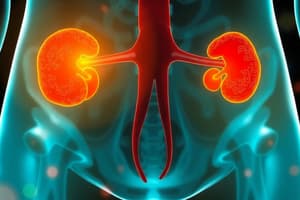Podcast
Questions and Answers
What is the primary role of the kidneys in maintaining body homeostasis?
What is the primary role of the kidneys in maintaining body homeostasis?
- Removing excess nutrients and toxins from blood (correct)
- Supporting muscle growth
- Storing excess water in the body
- Producing red blood cells
Where does urine formation primarily take place?
Where does urine formation primarily take place?
- Kidneys (correct)
- Liver
- Lungs
- Bladder
Which organ collaborates with the kidneys in the excretory system to filter blood and expel waste products?
Which organ collaborates with the kidneys in the excretory system to filter blood and expel waste products?
- Spleen
- Liver
- Pancreas
- Urinary bladder (correct)
What is the approximate filtration rate of blood in the kidneys per day to produce urine?
What is the approximate filtration rate of blood in the kidneys per day to produce urine?
Which part of the nephron selectively reabsorbs essential nutrients and water while removing waste products?
Which part of the nephron selectively reabsorbs essential nutrients and water while removing waste products?
What is the role of renin in the regulation of blood pressure?
What is the role of renin in the regulation of blood pressure?
Which hormone is produced by the kidneys to stimulate red blood cell production?
Which hormone is produced by the kidneys to stimulate red blood cell production?
What is the function of the loop of Henle in kidney physiology?
What is the function of the loop of Henle in kidney physiology?
How do the ureters contribute to the excretory system?
How do the ureters contribute to the excretory system?
What is the main function of the renal tubules in urine formation?
What is the main function of the renal tubules in urine formation?
Flashcards are hidden until you start studying
Study Notes
Biology of Excretion, Kidney Composition, and Functions
The Role of Kidneys in Maintaining Body Homeostasis
Kidneys are critical organs that play a pivotal role in maintaining the balance of water, electrolytes, and waste products within our bodies. They filter blood to remove excess nutrients, acids, and toxins, while preserving essential elements to ensure optimal bodily function. This process is essential to regulate the body's acid-base balance, blood pressure, electrolyte levels, and osmotic pressure.
Urine Formation and Excretory System Organs
Urine is produced as a byproduct of blood filtration and is then transported for excretion. The excretory system, including the kidneys, ureters, urinary bladder, and urethra, collaborates to filter blood and expel waste products. The filtration process begins with the glomerulus, a complex network of capillaries that filter blood at a pressure of approximately 60mmHg.
Functions of the Kidney
-
Filtration: Blood is filtered at a rate of about 200 liters per day to produce urine. The filtrate contains water, essential electrolytes, and urea but excludes larger molecules, blood cells, and proteins.
-
Reabsorption: Tubules of the nephrons selectively reabsorb essential nutrients and water while removing waste products. This vital process maintains the body's balance of water, electrolytes, and glucose.
-
Secretion: The renal tubules secrete hydrogen ions, potassium ions, and ammonia to help maintain acid-base balance and remove excess substances from the blood.
-
Regulation of Blood Pressure: Renin, a hormone produced by the kidneys, regulates blood pressure. As the blood flow to the kidneys decreases, renin is secreted to increase angiotensin, which constricts blood vessels and promotes aldosterone release. Aldosterone then increases sodium and water reabsorption by the kidneys, leading to increased blood volume and consequently, blood pressure.
-
Production of Erythropoietin and Vitamin D Activation: The kidneys produce erythropoietin, a hormone that stimulates red blood cell production. They also convert vitamin D to its active form, calcitriol, which promotes calcium absorption and supports bone mineralization.
Kidney Structure
The kidneys are bean-shaped organs that are roughly the size of a fist. They consist of three layers, with an outer renal fascia, a perirenal fat capsule, and an inner renal capsule. Each kidney contains around 1 million nephrons, the functional units of the kidney that consist of renal corpuscles, renal tubules, and associated capillary networks.
The kidneys are divided into renal cortex and renal medulla. The cortex contains the nephrons and is responsible for filtration and reabsorption. The medulla is composed of pyramid-shaped lobules, which contain collecting ducts and loop of Henle. The loop of Henle plays a vital role in concentrating urine and regulating water reabsorption.
The Role of the Ureters and Urinary Bladder
Ureters transport urine from the kidneys to the urinary bladder. The bladder stores urine until it is expelled from the body through the urethra. The urethra differs in males and females, as it is shorter and wider in males and has a longer, more tortuous passage in females.
Conclusion
The kidneys play a critical role in maintaining the balance of water, electrolytes, and waste products in the body. They filter blood, reabsorb nutrients and water, and secrete waste products to produce urine. Understanding the functions and structures of the kidneys is essential to appreciate their importance in maintaining our health and wellbeing.
Studying That Suits You
Use AI to generate personalized quizzes and flashcards to suit your learning preferences.



